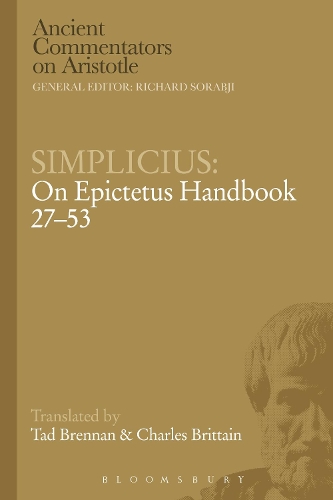
Simplicius: On Epictetus Handbook 27-53
(Paperback)
Available Formats
Publishing Details
Simplicius: On Epictetus Handbook 27-53
By (Author) Charles Brittain
By (author) Tad Brennan
Bloomsbury Publishing PLC
Bloomsbury Academic
26th March 2014
United Kingdom
Classifications
Tertiary Education
Non Fiction
Essays
Literary studies: fiction, novelists and prose writers
Ethics and moral philosophy
Literary studies: ancient, classical and medieval
170
Physical Properties
Paperback
240
Width 156mm, Height 234mm
290g
Description
The Enchiridion or Handbook of the first-century AD Stoic Epictetus was used as an ethical treatise both in Christian monasteries and by the sixth-century pagan Neoplatonist Simplicius. Simplicius chose it for beginners, rather than Aristotle's Ethics, because it presupposed no knowledge of logic. We thus get a fascinating chance to see how a pagan Neoplatonist transformed Stoic ideas. The text was relevant to Simplicius because he too, like Epictetus, was teaching beginners how to take the first steps towards eradicating emotion, although he is unlike Epictetus in thinking that they should give up public life rather than acquiesce, if public office is denied them. Simplicius starts from a Platonic definition of the person as rational soul, not body, ignoring Epictetus' further whittling down of himself to just his will or policy decisions. He selects certain topics for special attention in chapters 1, 8, 27 and 31. Things are up to us, despite Fate. Our sufferings are not evil, but providential attempts to turn us from the body. Evil is found only in the human soul. But evil is parasitic (Proclus' term) on good. The gods exist, are provident, and cannot be bought off.With nearly all of this the Stoics would agree, but for quite different reasons, and their own distinctions and definitions are to a large extent ignored. This translation of the Handbook is published in two volumes. This is the second volume, covering chapters 27-53; the first covers chapters 1-26.
Author Bio
Tad Brennan is Associate Professor at the Department of Philosophy, Yale University, USA. Charles Brittain is Associate Professor at the Department of Classics, Cornell University, USA.
